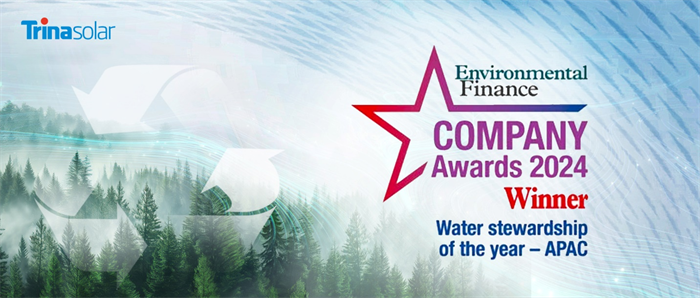Trinasolar has been named the Asia-Pacific winner in the water stewardship section of this year's Sustainable Company Awards, organized by the online news and analyst service Environmental Finance. The award recognizes Trinasolar's outstanding performance in reducing water consumption, making it the only company in the Asia-Pacific to receive the honor this year. This underlines Trinasolar's excellence in sustainable water management and consolidates its position as a leader in sustainable development.

The Sustainable Company Awards honor companies that are actively driving change in their approach to responsibility and sustainability, pivoting their resources, operations and entire business model to align with sustainability and climate targets and even push past them.
Trinasolar attaches great importance in all its operations to their impact on the environment. Over the past year Trinasolar has adopted more measures to reduce water consumption. The company uses the World Resources Institute's water risk assessment tool, the Aqueduct Water Risk Atlas, to evaluate water risk levels in areas in which its 23 production plants are located. This helps to effectively identify potential water shortage problems and take appropriate steps to use water more efficiently, further reducing risks to this priceless resource.
Last year Trinasolar efficiently saved and made use of water through by modifying equipment, upgrading technology and reclaiming used water, among other measures. Compared with 2020, Trinasolar's water consumption intensity of cell and module products fell by 85.48% and 44.4% respectively, matching or exceeding preset water management goals.
Wu Xiao, the Head of Risk Control and ESG Management at Trinasolar, said: “Effective water management is vital to sustainable development, and for many years we have been committed to reducing water consumption intensity of our products. This award recognizes that commitment, and we are now more determined than ever to ensure that whatever we do is more efficient and environmentally friendly, and to become more innovative in water reuse and water-saving technologies.”
